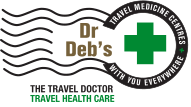New Research: Scary for Travellers Health
October 2nd, 2012A video, twitter chat, and Press release about travel health.

Research from Australia reveals patients who sought advice from their GP before international travel were both significantly more likely to be fully vaccinated against some common diseases in their destination and to have discussed the risk of diseases, thereby reducing their risk of acquiring these infectious diseases while abroad.
Queenslanders are putting themselves at risk of contracting potentially serious infectious diseases while travelling abroad.1
Researchers from the University of Sydney’s Family Medicine Research Centre have found more than three-in-five Australians are not seeking professional health advice before travelling overseas, with many visiting destinations carrying a risk of infectious diseases, including hepatitis A and B, typhoid fever and rabies.1
Given there is up to a 50 per cent chance of experiencing a travel-related illness,2 doctors are issuing international travellers with a travel health warning today – seek professional health advice before venturing overseas.
“Australians are travelling in record numbers, making almost eight million short-term overseas trips within a year, with Indonesia the country’s second most popular travel destination,”3 said public health physician and travel doctor, Dr Conrad Moreira.
”However, a ticket to Indonesia carries the risk of a mild infection with travellers’ diarrhoea or “Bali Belly”, through to serious infectious diseases, such as rabies, hepatitis A and malaria,”4 warned Dr Moreira.
“Complacent travellers may not only be risking infection with gastrointestinal, insect and blood-borne diseases while overseas,5 but potentially spreading these diseases across international borders, through their travel patterns and behaviours.6
”When it comes to overseas travel, prevention is infinitely better than cure,” Dr Moreira said.
“The health consequences of travelling overseas can range from trivial to life-threatening,” said Medical Director of Dr Deb – The Travel Doctor, Brisbane, Dr Deb Mills.
“Certainly, only a few travellers get really ill. However those who seek pre-travel advice are better placed to avoid illness and look after their health while away.
“Wise travellers are armed with a medical kit, vaccinations and information to help them stay healthy.
Many precautions are simple with the right knowledge, for example, avoiding food and water diseases and bed bugs, and protecting against altitude sickness,” Dr Mills said.
Spearheaded by the University of Sydney’s Family Medicine Research Centre in collaboration with CSL, the BEACH sub-study analysed the international travel patterns, travel health behaviours and pre-travel vaccination rates of a sample of 102 GP’s with 2,995 patient respondents nation-wide.1
Among the 670 research respondents, only 30 per cent obtained travel advice from a GP before departure, while only 4 per cent sought advice from a travel clinic. In addition, a low proportion of patients were fully vaccinated before travelling to an at-risk destination for infectious diseases, including hepatitis B, typhoid, and hepatitis A infections.1
Among those respondents visiting at-risk destinations, commonly cited reasons for not being fully vaccinated included patient refusal (32 per cent); GP considered vaccination not required (23 per cent); non-disclosure of their trip to a GP before travelling (14 per cent); or leaving the visit too late to fully vaccinate (7 per cent).1
“While each traveller has individual requirements depending on where they’re going and what they’ll be doing, as a general rule, it’s advisable to see a travel doctor or GP at least 6-to-8 weeks before departure,”2,7,8 said Dr Mills.
“It’s a myth that travelling ‘5-star’ protects you from developing travel-related illnesses.
“You walk through the same streets as other travellers, where there may be potentially rabid dogs. Mosquitoes may fly into resorts. You may choose to dine at a classy hotel, but people sometimes get sick from hotel food,” Dr Mills said.
Betty, 63, from Brisbane takes the road less travelled. She loves nothing more than getting off the beaten track, to visit exotic international destinations, either on her own, or with small travel groups, often to meet the children whom she has sponsored for years.
“I have retraced the footsteps of our Australian diggers along the Kokoda Trail, in Papua New Guinea. I’ve also trekked along the arduous Kalimantan mountain range in the heart of Borneo, not making contact with a single person outside of our group for eight consecutive days,” said Betty.
“During my travels, I have only ever experienced a few health problems; however, I have had a few scares over the years.”
While in Lombok, a monkey grabbed Betty’s arm and bit her. Although she was wearing long sleeves at the time, the monkey tried to bite through her cuff and eventually succeeded.
“Luckily, the monkey only left an indent on my wrist and I had been vaccinated against rabies. However, if the monkey had broken the skin I would have sought advice, as it is important to visit a health clinic immediately following a potential rabies exposure to have the injury cleaned and assessed,” said Betty.
“I am particularly concerned about exposure to a variety of infectious diseases when visiting exotic destinations. I would be so disappointed if a travel illness disrupted my holiday. Personally, I want to enjoy my holiday and not end up in hospital, or in a place that has no hospital.”
Dr Moreira says anyone is potentially at risk of contracting a travel-related infectious disease, as they are not just limited to less-developed countries.6
“The risk depends on the destination as well as the type of person travelling. Certain groups of travellers are at higher risk of infectious diseases, including pregnant women, children, people with impaired immunity and immigrants returning to their country of origin to visit friends and relatives,”5 said Dr Moreira.
About the research1
The University of Sydney’s national BEACH sub-study was conducted in collaboration with CSL between May and June 2012, involving 102 GPs nation-wide who completed a survey with 2,995 patient respondents. The study analysed the international travel patterns, travel health behaviours and pre-travel vaccination rates among Australian travellers in a general practice setting.
Eight travel-related infectious diseases were included in the study: hepatitis A & B, malaria, typhoid fever, rabies, cholera, meningococcal disease and Japanese encephalitis. At-risk destinations were determined by drawing on World Health Organization (WHO) and Center for Disease Control (CDC) disease endemicity data and recommendations of those who should be considered for vaccination; although vaccination may not have been required in all travellers visiting the at-risk destinations.
ends#
For more information, please contact Kirsten Bruce or Mahsa Lotfizadeh from VIVA! Communications on 02 9968 3741 or 0401 717 566 / 0422 180 674.
Full media kit available for download on Wednesday, October 3 at www.vivacommunications.com.au/travel
References
- Family Medicine Research Centre (FMRC), University of Sydney. SAND abstract No. 196 from the BEACH program: Travel advice and vaccination. Sydney: FMRC University of Sydney. 2012. ISSN 1444-9072. Available at http://sydney.edu.au/medicine/fmrc/publications/sand-abstracts/196-Travel_advice_and_vaccination.pdf
- State Government of Victoria. Better Health. Travel health tips. Last reviewed January 2012. Available at http://www.betterhealth.vic.gov.au/bhcv2/bhcarticles.nsf/pages/Travel_health_tips [last accessed July 27, 2012].
- Australian Bureau of Statistics (ABS). Overseas arrivals and departures, short term departures. December 2011 (cat. No. 3401.0).
- Travel Health Advisory Group. Indonesia. 2012. Available at http://www.welltogo.com.au [Last accessed 30 August 2012].
- National Health and Medical Research Council (NHMRC). The Australian Immunisation Handbook, 9th Edition. 2008.
- Heywood et al. A cross-sectional study of pre-travel health-seeking practices among travellers departing Sydney and Bangkok airports BMC Public Health 2012; 12:321.
- Travel Health Advisory Group. Checklists and travel tips: before you go. Available at http://welltogo.com.au/checklists/beforeyougo.asp [last accessed July 27, 2012].
Issued on behalf of CSL Biotherapies Pty Ltd 45 Poplar Road Parkville ABN 66 120 398 067



